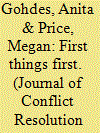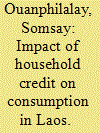| Srl | Item |
| 1 |
ID:
125139


|
|
|
|
|
| Publication |
2013.
|
| Summary/Abstract |
We address weaknesses in the Peace Research Insitute Oslo (PRIO) Battle Deaths Dataset, and as a result draw contradicting conclusions to those presented by Lacina and Gleditsch. Our analysis focuses on the availability of data on battle deaths within specific conflict-years and problems encountered when data from multiple types of sources are combined. We repeat Lacina, Gleditsch, and Russett's analysis of battle deaths over time, with an attempt to provide a more robust model and incorporate an estimate of the uncertainty present in the PRIO Battle Deaths Dataset. This reanalysis reveals that the data used to establish the PRIO Battle Deaths Dataset does not offer a clear answer as to whether battle deaths have decreased or increased since the end of the Second World War. We contend that while the PRIO Battle Deaths Dataset offers the most comprehensive assembly of battle deaths data available to date, it is not suitable for analysis across countries or over time.
|
|
|
|
|
|
|
|
|
|
|
|
|
|
|
|
| 2 |
ID:
154536


|
|
|
|
|
| Summary/Abstract |
This study evaluates the impact of credit on consumption in Laos. A two-stage selection bias correction method based on a multinomial logit framework is used to estimate and compare the consumption of borrowing households with and without credit. The results show that compared to what household consumption would have been without credit, borrowing households tend to have higher overall consumption. However, when consumption is disaggregated into food and nonfood, it is found that only formal credit has a positive impact on food spending. Borrowing from semiformal sources and informal sources without interest has a negative impact on food spending. For nonfood consumption, the impact of credit is found to be positive and statistically significant for all credit sources.
|
|
|
|
|
|
|
|
|
|
|
|
|
|
|
|
| 3 |
ID:
070972


|
|
|
|
|
| Publication |
2006.
|
| Summary/Abstract |
One major concern in the study of international economic sanctions is the potential problem of selection bias. Game-theoretical analyses assert that the private suggestion of sanctions could bring about the desired change in behaviour: sanctions are least likely to be imposed when they are most likely to be effective. If this were true frequently enough, the study of sanctions implemented by states (such as in the data developed by Hufbauer, Schott, and Elliott [HSE]) would provide an incomplete picture of the effectiveness of the sanctions approach. In this article, we adapt Boolean analytic techniques to estimate selection bias in the HSE data. This analysis yields evidence of selection bias - suggesting that we should reconsider existing empirical research based on those data. We conclude by considering research approaches that could capture the cases lost to selection bias in the HSE data.
|
|
|
|
|
|
|
|
|
|
|
|
|
|
|
|